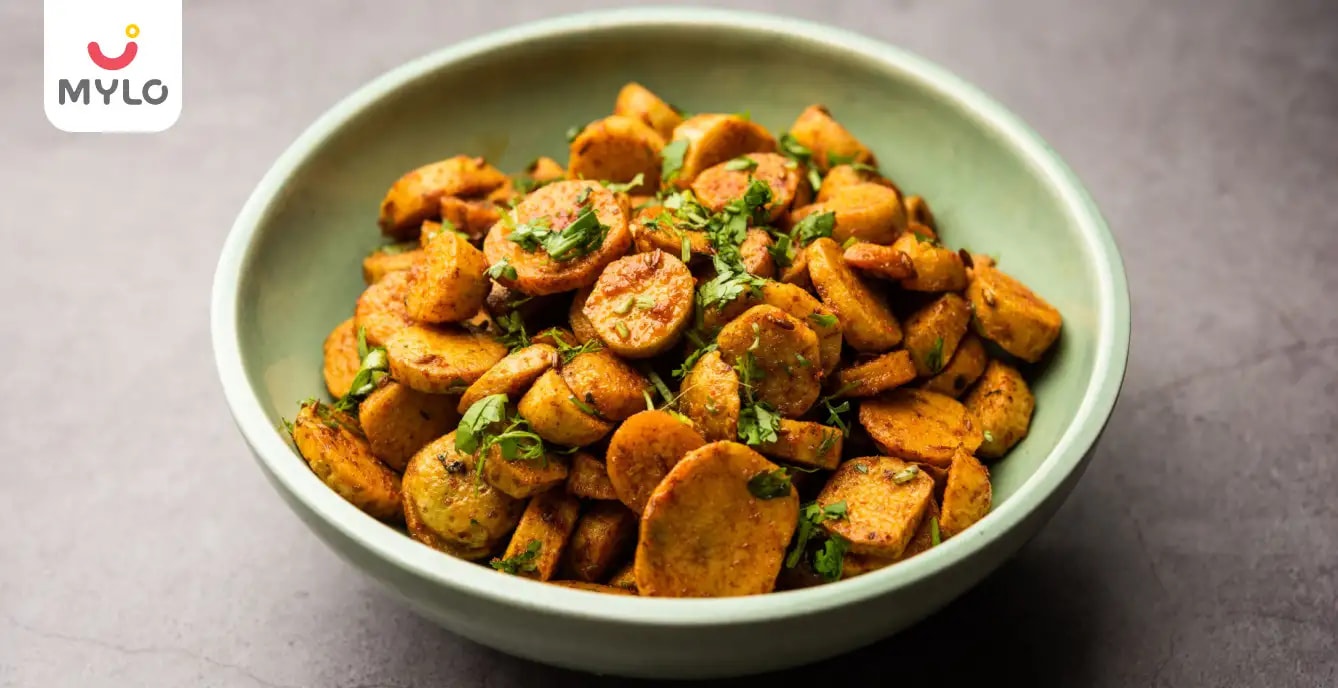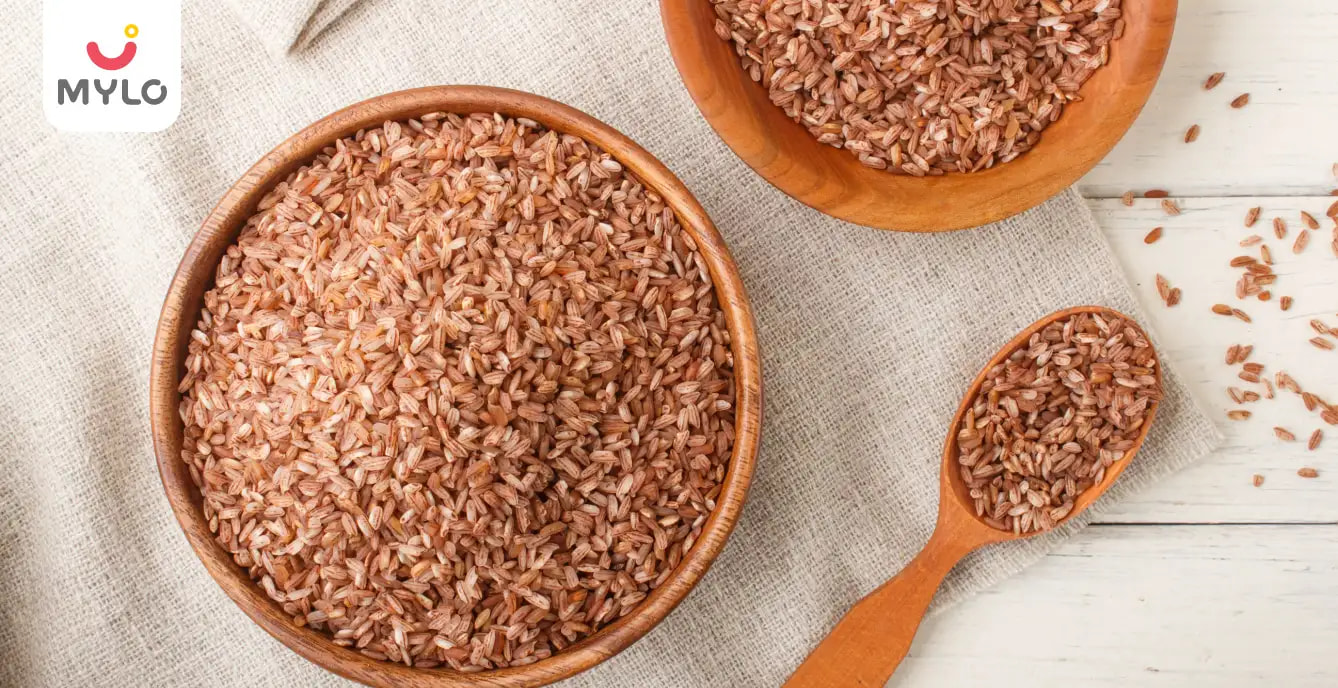Home

Pregnancy Journey

Sweet Potato During Pregnancy: Benefits, Risks & Side Effects
In this Article
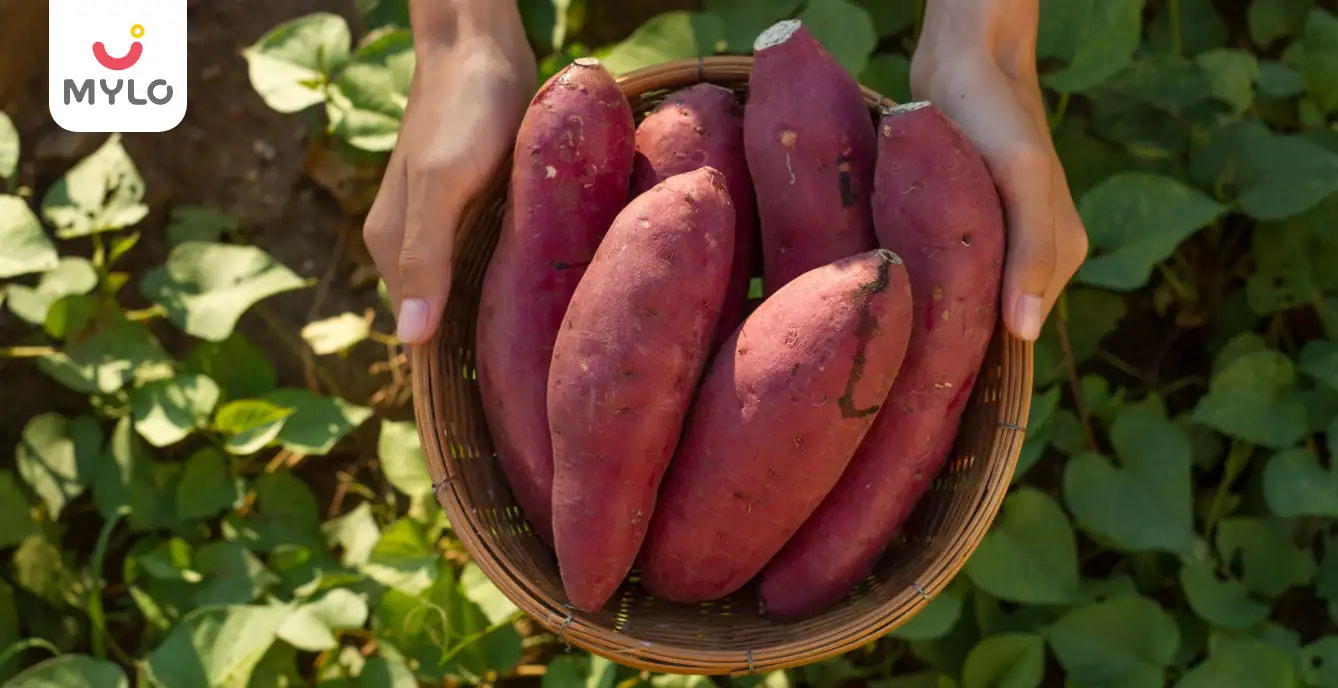
Pregnancy Journey
Sweet Potato During Pregnancy: Benefits, Risks & Side Effects
Updated on 13 November 2023
However, as with any food during pregnancy, it's important to understand both the advantages and potential risks associated with consuming sweet potatoes. In this article, we will explore the incredible benefits of sweet potato during pregnancy, any potential risks or side effects, and provide guidance on how to incorporate them into a healthy diet. So if you’re wondering whether or not you should be eating sweet potato in pregnancy, read on for everything you need to know.
Nutritional value of sweet potato
The importance of eating sweet potato in pregnancy cannot be understated. Sweet potatoes are an excellent source of vitamins and minerals, including beta-carotene, which is converted to vitamin A in the body. Vitamin A is important for the development of the baby’s eyes, skin, and immune system. Sweet potatoes are also a good source of fibre, which can help with constipation, a common problem during pregnancy.
What are the benefits of sweet potato during pregnancy?
There are countless benefits of sweet potato during pregnancy. Here's what you need to know.
1. Nutrient-dense
Sweet potatoes are an excellent source of nutrients for pregnant women. They are rich in vitamins A, C, and B6, as well as potassium and fibre.
2. Prevent pregnancy-related problems
They can help to prevent constipation, maintain blood sugar levels, and provide the body with important antioxidants.
3. Proper baby development
Sweet potatoes are also a good source of folate, which is essential for the development of the neural tube in the baby's brain and spine.
Side effects of eating sweet potato during pregnancy?
There are a few side effects that have been associated with eating sweet potatoes during pregnancy. These include an increased risk of gestational diabetes, constipation, and diarrhoea. While these side effects are relatively mild and unlikely to cause serious harm to the mother or child, it is important to be aware of them before consuming sweet potatoes during pregnancy.
Risks of eating sweet potato in pregnancy?
Can we eat sweet potato during pregnancy? This is a commonly asked question. Sweet potatoes in pregnancy are generally considered safe to eat. However, there are a few potential risks to be aware off:
1. High oxalate level
One risk is that sweet potatoes may contain high levels of oxalates. These are compounds that can bind to calcium and other minerals in the body, making them unavailable for absorption. This can lead to deficiencies of these important nutrients.
2. High levels of natural pesticide
Another concern is that sweet potatoes may contain high levels of a natural pesticide called solanine. This substance can cause gastrointestinal upset and even nerve damage in high doses. Pregnant women should avoid eating any food that contains high levels of solanine.
You may also like: 7 Excellent Sources of Omega-3 Fatty Acids For Expecting Mothers
Can sweet potatoes lead to miscarriage?
There is no scientific evidence to suggest that sweet potatoes can lead to miscarriage. However, as with any food, it is important to eat them in moderation. Too much of anything can be harmful, and this includes sweet potatoes. Eating large amounts of sweet potatoes may cause gastrointestinal issues like gas and bloat. These symptoms can be uncomfortable and may even lead to vomiting. If you experience any of these symptoms, it’s best to stop eating sweet potatoes and speak with your doctor.
How to eat sweet potato during pregnancy?
When you're pregnant, you need to make sure you're getting enough nutrients to support both you and your baby. Sweet potatoes are a great option for adding nutrients to your diet. Here's how to eat sweet potato during pregnancy.
You can roast them, bake them, or mash them. You can also add them to soups or stews. Sweet potatoes go well with other foods like chicken, fish, rice, and beans.
Also read: Guide: Following A Healthy Diet During Your First Trimester Of Pregnancy
Frequently asked questions and answers
1. Is sweet potato skin healthy during pregnancy?
Sweet potato skin is very healthy for pregnant women. It is a good source of fibre, which can help prevent constipation and other digestive issues common in pregnancy.
2. Is it safe for a pregnant woman to eat fried sweet potatoes?
Fried sweet potatoes are generally safe for pregnant women to eat in moderation. However, it is important to keep in mind that fried foods are generally less healthy than other cooking methods like baking or steaming. Baking or steaming are the best ways to eat sweet potato in pregnancy.
You may also like: Healthy Pregnancy Food
Conclusion
Overall, eating sweet potato during pregnancy is a nutritious and safe choice. It’s rich in vitamins, minerals, and fibre, which can help pregnant women (and their babies) stay healthy. We have covered in this blog important points like how to eat sweet potato during pregnancy and can pregnant women eat sweet potato. It is important to remember that there are some risks and side effects associated with eating sweet potatoes during pregnancy. So be sure to talk to your doctor before adding it to your diet. Visit Mylo family for educational blogs on expecting mothers and newborn babies.
References
1. Girard, A. W., Grant, F., Watkinson, M., Okuku, H. S., Wanjala, R., Cole, D., Levin, C., & Low, J. (2017). Promotion of Orange-Fleshed Sweet Potato Increased Vitamin A Intakes and Reduced the Odds of Low Retinol-Binding Protein among Postpartum Kenyan Women. The Journal of Nutrition, 147(5), 955–963.
2. Jouanne, M., Oddoux, S., Noël, A., & Voisin-Chiret, A. S. (2021). Nutrient Requirements during Pregnancy and Lactation. Nutrients, 13(2), 692.
Tags
Sweet Potato During Pregnancy in Hindi, Sweet Potato During Pregnancy in Tamil, Sweet Potato During Pregnancy in Telugu, Sweet Potato During Pregnancy in Bengali



Written by
Loveleen Gupta
A working mother with more than two decades of experience in writing for the publishing industry and digital space, Loveleen Gupta loves dabbling in creative writing also. A graduate from Miranda House, she uses her personal experiences to express herself.
Read MoreGet baby's diet chart, and growth tips

Related Articles
RECENTLY PUBLISHED ARTICLES
our most recent articles
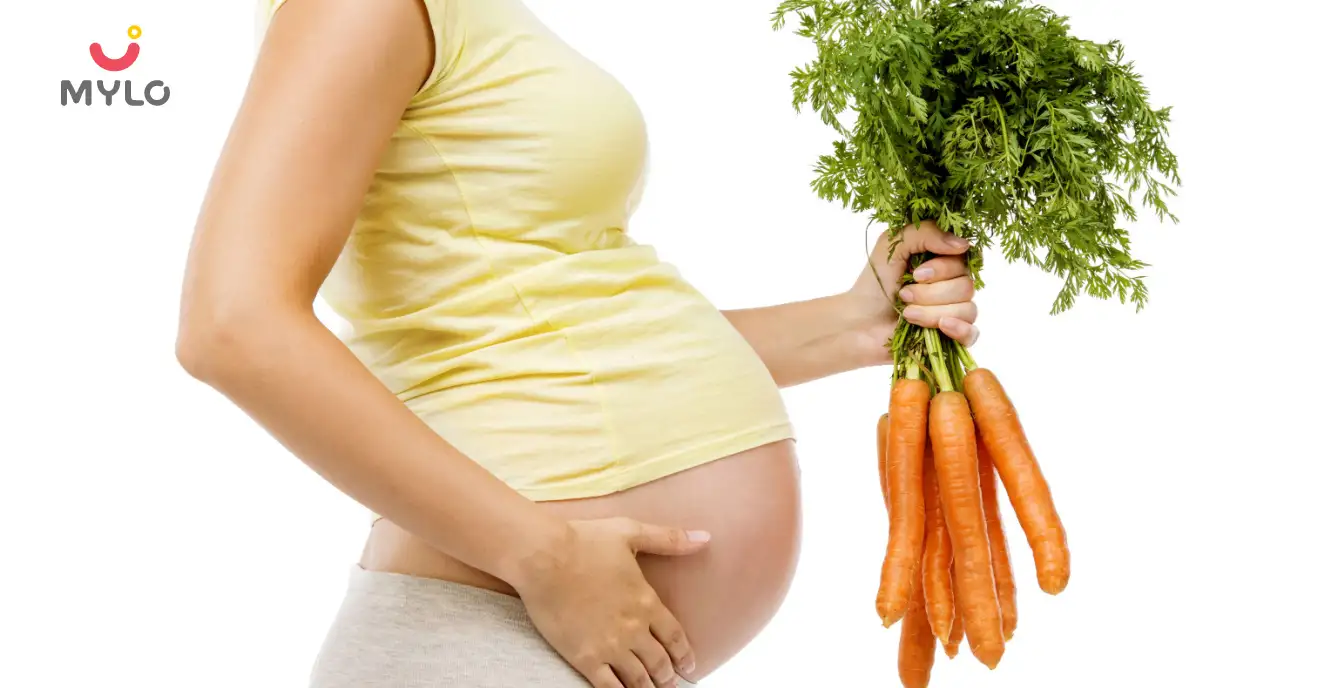
Diet & Nutrition
Carrot During Pregnancy: How This Healthy Snack Can Help You and Your Baby
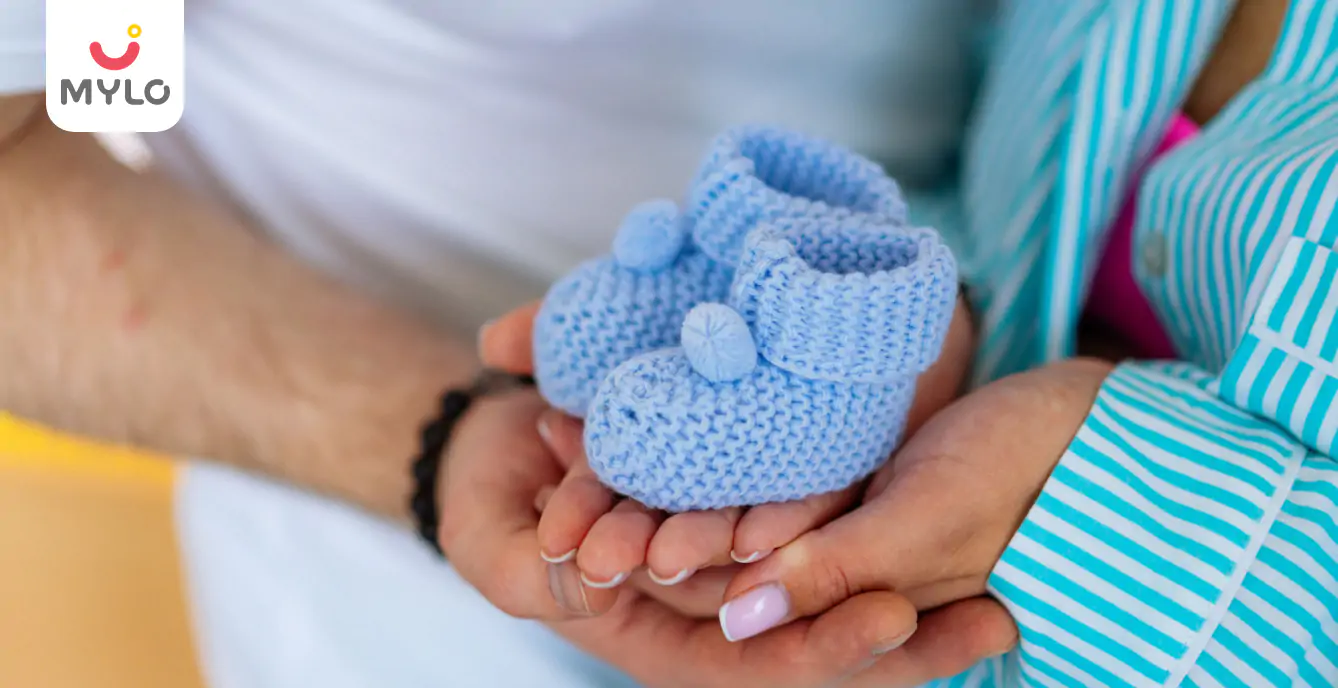
Pregnancy Journey
30+ Maternity Photoshoot Props: Accessories for Maternity Photoshoot

Diapering
Diaper Pants 101: Everything You Need to Know Before You Buy

Diet & Nutrition
Can We Eat Curd During Periods: Understanding the Dairy Dilemma
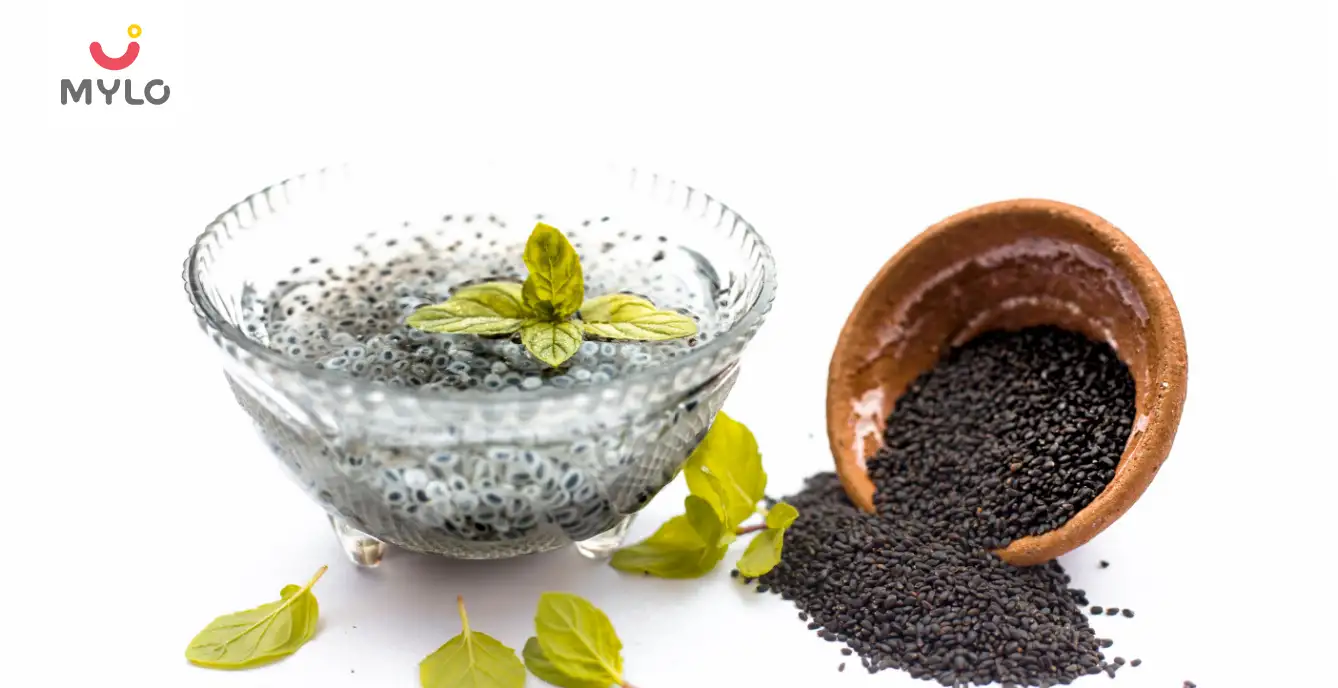
Diet & Nutrition
Sabja Seeds During Pregnancy: Benefits & Side Effects

Rashes
Newborn Diaper Rash: Causes, Treatment and Prevention Tips
- New Born Baby Diapers: Understanding the Quantity and Sizing Needs of Your Little One
- The Ultimate Guide to Supplementing with Omega 3 for PCOS
- The Ultimate Guide to Safe and Effective Exercise in Periods
- PCOS Hair Growth: Causes, Symptoms, and Effective Treatment Options
- Endometrial Hyperplasia: The Ultimate Guide to Understanding Its Causes and Treatment
- Lights, Camera, Baby Bump: Movies to Watch During Pregnancy
- Squat During Pregnancy Benefits & Precautions
- The Ultimate Guide to Thyroid Treatment in Ayurveda
- Ayurvedic Treatment for Acne: Holistic Healing for Clear Skin
- Gokshuradi Guggulu: Ayurveda's Solution for UTI and Kidney Support
- The Surprising Benefits of Dark Chocolate for Periods
- How to Reduce Air Pollution in Your Daily Life
- Normal Prolactin Levels to Get Pregnant: What You Need to Know
- What Causes Low HCG Levels in Early Pregnancy & How to Increase It?


AWARDS AND RECOGNITION

Mylo wins Forbes D2C Disruptor award

Mylo wins The Economic Times Promising Brands 2022
AS SEEN IN

- Mylo Care: Effective and science-backed personal care and wellness solutions for a joyful you.
- Mylo Baby: Science-backed, gentle and effective personal care & hygiene range for your little one.
- Mylo Community: Trusted and empathetic community of 10mn+ parents and experts.
Product Categories
Baby Carrier | Baby Soap | Baby Wipes | Stretch Marks Cream | Baby Cream | Baby Shampoo | Baby Massage Oil | Baby Hair Oil | Stretch Marks Oil | Baby Body Wash | Baby Powder | Baby Lotion | Diaper Rash Cream | Newborn Diapers | Teether | Baby Kajal | Baby Diapers Pants | Cloth Diapers | Laundry Detergent | Lactation Granules |




